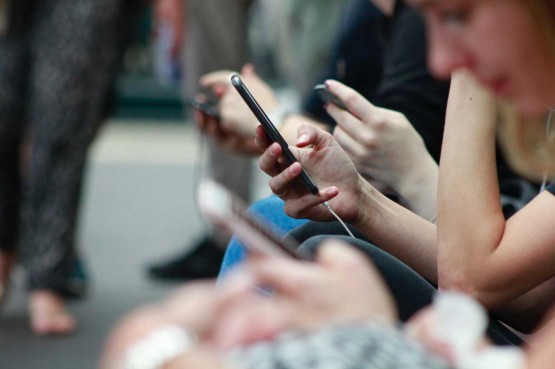Photo by Ilyass SEDDOUG on Unsplash
When we say it’s important to talk to people about their mental health, how can we make sure we’re talking with someone in a way that’s helpful? There’s a belief that talking about mental illness as a disease (the disease model) reduces stigma and makes it easier for people to get treatment. The idea is that talking about mental health problems as illnesses makes it easier to see that people who struggle with symptoms of depression, anxiety, or substance use problems are not weak or lazy. However, as that message has become more common over time, attitudes toward people with mental illness—for example socializing with those who are considered ill, diseased, or different—have not changed (1).
Emphasizing similarities is another approach. Everyone has strong emotional reactions sometimes or trouble coping with stress. Because of this, some researchers, clinicians, and people with the lived experience of mental health problems think that the best approach to talking about mental health is to focus on the similarities, thinking of mental health problems as a continuum from the normal “being stressed out” to extreme reactions to stress (2). This might still lead to negative feelings about people who have severe mental health problems that they can’t overcome—if everyone experiences the same types of emotions, why can’t some people just bounce back or deal with it the way others can? It also might lead to the person struggling with the problem feeling like they should be able to cope regardless of how strong their feelings are or how difficult their problems are to overcome (3).
There’s no easy solution to this dilemma. But there are some common-sense things that are useful when talking to people who are struggling with mental health problems. These things are are also part of common emotional support trainings such as Mental Health First Aid (4), Emotional CPR (5), and Intentional Peer Support (6). Listening nonjudgmentally and with respect is probably the most important because it validates the experience a person is going through. Allowing people to talk about what’s bothering them and asking them what happened (instead of “what’s wrong with you”) shows that you’re interested in their perspective and experiences and that you aren’t making judgments about them as a person.
Being able to connect socially, especially in times of stress, is vital for mental well-being. For many people, this takes place online and even through video games. Organizations like Anxiety Gaming (7) and Stack Up (8) are gamer communities that focus on helping people with mental health struggles by connecting them with others and by providing education about mental health. Connecting is easier when people share interests, and in this case the gaming community offers gamers a source of potential friendships and peer support.
Encouraging people who are struggling to seek formal and informal support and to take care of themselves using their ”personal medicine”(9)—the activities they choose to help them to cope and be happy—is another way to talk about it. This type of talking and connection is an important factor in traditional “talk” therapies, and sharing information online about what works (without being judgmental!) is another thing people can do in online communities. Some gamers who stream on Twitch have used their visibility to talk openly about their mental health struggles (e.g., SheSnaps (10)). In her stream she talks about the story of her mental health struggles but also provides support to viewers who share their own experiences.
Games and gaming communities, as well as online avenues in general, provide a lot of opportunities for people to talk about mental health. This is an area where there are no best practices yet, but speaking and listening without judgment is a good way to connect and share support.
1. Schomerus G, Schwahn C, Holzinger A, Corrigan PW, Grabe HJ, Carta MG, et al. Evolution of public attitudes about mental illness: a systematic review and meta-analysis. Acta Psychiatr Scand. 2012 Jun 1;125(6):440–52.
2. Kingdon D. Everybody gets stressed … it’s just the way we react that differs †. Psychiatr Bull. 2009 Dec;33(12):441–2.
3. Gergel TL. Too similar, too different: the paradoxical dualism of psychiatric stigma. Psychiatr Bull. 2014 Aug;38(4):148–51.
4. Mental Health First Aid: What You Learn [Internet]. Mental Health First Aid. 2013 [cited 2018 Jan 8]. Available from: https://www.mentalhealthfirstaid.org/take-a-course/what-you-learn/
5. About eCPR | Emotional CPR [Internet]. [cited 2018 Sep 17]. Available from: https://www.emotional-cpr.org/about-ecpr.htm
6. What is IPS? [Internet]. Intentional Peer Support. [cited 2018 Sep 17]. Available from: https://www.intentionalpeersupport.org/what-is-ips/
7. Anxietygaming: About Us [Internet]. Anxiety Gaming. [cited 2017 May 15]. Available from: https://anxietygaming.com/about/
8. Homepage – Stack-Up.org [Internet]. [cited 2015 Dec 27]. Available from: http://stack-up.org/
9. Deegan PE. The importance of personal medicine: a qualitative study of resilience in people with psychiatric disabilities. Scand J Public Health Suppl. 2005 Oct;66:29–35.
10. Keilman J. Video game streamers find another way of connecting to audiences: giving out personal advice. The Chicago Tribune [Internet]. 2018 Sep 10 [cited 2018 Sep 10]; Available from: http://www.chicagotribune.com/news/ct-met-video-games-streamers-mental-health-20180823-story.html




